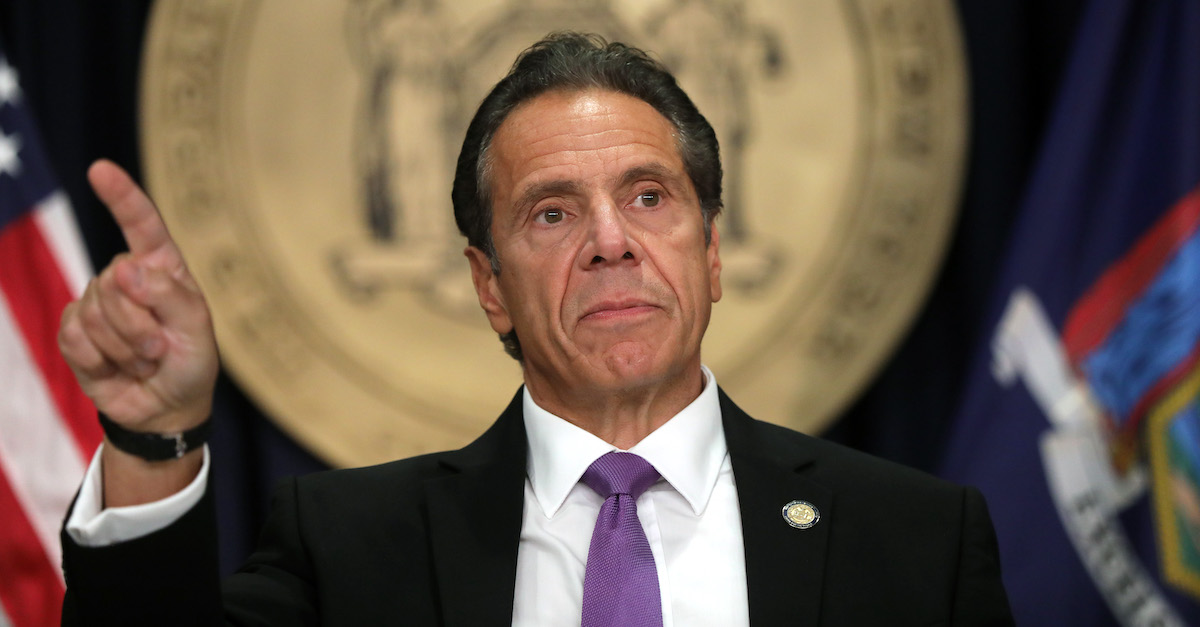
New York Gov. Andrew Cuomo, a Democrat who reportedly has no interest in being considered for attorney general in the incoming Biden administration, has signed a bill into law which he even seems to admit may be unconstitutional.
The law says its aim is to “[p]rohibit symbols of hate” from being sold by the state. It broadly defines “symbols of hate” as “symbols of white supremacy, neo-Nazi ideology or the Battle Flag of the Confederacy,” among other things, and with a few exceptions. Here’s the law’s own verbiage:
The state of New York shall not sell or display any symbols of hate or any similar image, or tangible personal property, inscribed with such an image unless the image appears in a book, digital medium, museum, or otherwise serves an educational or historical purpose.
For the purposes of this section, the term “symbols of hate” shall include, but not be limited to, symbols of white supremacy, neo-Nazi ideology or the Battle Flag of the Confederacy.
Specifically called out by the new law is the New York State Fair and other local fairs, where controversy has existed for several years over the selling of Confederate-themed merchandise. The law directs the Commissioner of Agriculture and Markets to:
Take any measures necessary to prohibit the sale, on the grounds of the state fair and any other fairs that receive government funding, of symbols of hate, as defined [above], or any similar image, or tangible personal property, inscribed with such an image, unless the image appears in a book, digital medium, or otherwise serves an educational or historical purpose.
A justification section attached to the legislation reads as follows:
The Confederate Flag is a symbol of racism, exclusion, oppression and violence towards African Americans. Its symbolism and history are directly linked to the enslavement, torture and murder of millions of African Americans throughout the mid-19th Century and beyond. Even today, the Confederate flag is accounted in the Anti-Defamation League’s Hate Symbols Database and is considered to be one of the most prevalent symbols of white supremacy. Its public display is designed only to instill fear, intimidation and a direct threat of violence towards others.
New York State has already taken actions in regards to deeming the Confederate flag as a symbol of hate. In 2018, the Commissioner of the Department of Agriculture and Markets penned a memo urging vendors to practice inclusive standards, and to prohibit the sale or display of products that may be considered offensive after numerous complaints of Confederate products at the State Fair. The Commissioner stated that the sale of these offensive products could pose an issue to public health and safety concerns.
This bill would limit the display of the Confederate flag, as well as other symbols of hate, on or within the grounds of public property, including fairgrounds. Further, it makes clear that New York State will not tolerate racism, exclusion, oppression, and violence through the display of such antagonistic and deeply hurtful symbols.
Cuomo said the law needs to be reworked (according to an account in the New York Post).
“While I fully support the spirit of this legislation, certain technical changes are necessary to balance the State’s interests in preventing the use of hate symbols on state land with free speech protections embodied in the First Amendment of the United States Constitution,” Cuomo said, per the Post.
A press secretary to Sen. Alessandra Biaggi, a Democrat from the Bronx who sponsored the bill, told the Post that a “chapter amendment” was already in the works to ensure vendors and individuals could exercise their First Amendment rights at the state fair and other local fairs.
The law’s perplexing trajectory — officials signed it and then admitted needed to be walked back — was met with scorn.
How does this even happen? There is a 0% chance that this law survives. It is not a close question or a question at all. https://t.co/dSqTRWrf3f
— Daniel A. Horwitz (@Scot_Blog) December 16, 2020
My thought is that if there is anyone in New York who wants to challenge this, I (or any other First Amendment lawyer) would take this case in a heartbeat.
— Marc J. Randazza (@marcorandazza) December 16, 2020
Another person, in a since-deleted tweet, asked why the so-called “technical changes” were not made before the law was signed.
Some critics were levying assessments against the law based on a description in the Post which made the law sound broader than it actually is. The Post said the law banned so-called “hate symbols” from being sold “on state property” and “on public grounds including state and local fairs.” The first section of the law itself facially bans only the state itself from selling “hate symbols” in public buildings. The second section of the law itself contains no mention whatsoever of “public grounds.” It only pertains to fairs which receive government funding.
The law passed the state senate 57-3. Most Republicans voted for it; only three (Andrew Lanza of Staten Island, Pamela Helming of Canandaigua, and Thomas F. O’Mara of Big Flats in the Southern Tier) did not. It sailed easily through two state assembly committees with unanimous favorable votes and passed the full state assembly with unanimous support. Democrats control the state senate 40 to 21 (two seats are currently vacant); they also hold 102 of the 150 total seats in the state assembly.
The law amended New York’s public buildings law and agriculture and markets law. The public buildings law already bans the display of the flags of foreign governments at public buildings unless a foreign dignitary is visiting as an official guest. Other provisions of the public buildings law require “gender neutral single-occupancy bathrooms,” water conservation, restrictions on lighting, and lactation rooms.
Law&Crime has reached out to Cuomo’s press office for a full copy of the governor’s statement upon signing the bill. If we receive a reply, we will include the statement here.
[Photo by Spencer Platt/Getty Images]
Have a tip we should know? [email protected]